The suggested solution
keybd_event(VK_HOME, 0, 0, 0);
keybd_event(VK_HOME, 0, KEYEVENTF_KEYUP, 0);
is not safe, no matter when you execute it.
What if I press Ctrl+O in the app and switch to a different app while waiting for the dialog to show?
Then this other app will receive the HOME key. Then anything can happen. The other app might be displaying a track bar controlling the rate of flow of a patient's IV drugs, and that HOME key might set the trackbar to 0 cc/min.
More likely: you lose the selection in an Explorer window (possibly containing a thousand images), the caret pos in a document (located at a very particular place), the selected node in a tree view, etc. Or your media player restarts the current track.
And yes, many people (such as myself) really do multitask in that way!
This is a possible (safe) solution. I don't claim that it is the most elegant one, though.
The approach is as follows:
I use the OnSelectionChange event to get a chance to run some code after the dialog window has been created. However, I must manually make sure that I only run my "file name fix" the very first time this event is fired. I also make sure only to run this code if the (default) file name is non-empty.
The first time the event is fired, I find the edit box inside it. I "know" it is the right control because (1) it is an edit box and (2) its text is equal to the (default) file name (which is not empty).
I then specifically instruct this edit box to move its caret to the first character, and then to (re)select every character.
Full code:
type
TOpenDialogFileNameEditData = class
FileName: string;
Handle: HWND;
end;
function EnumChildProc(h: HWND; lp: LPARAM): BOOL; stdcall;
var
WndClass, WndTxt: array[0..1024] of Char;
begin
Result := True;
FillChar(WndClass, SizeOf(WndClass), 0);
FillChar(WndTxt, SizeOf(WndTxt), 0);
if GetClassName(h, WndClass, Length(WndClass)) <> 0 then
begin
if SameText(WndClass, 'Edit') then
begin
if GetWindowText(h, WndTxt, Length(WndTxt)) <> 0 then
begin
if WndTxt = TOpenDialogFileNameEditData(lp).FileName then
begin
TOpenDialogFileNameEditData(lp).Handle := h;
Exit(False);
end;
end;
end;
end;
end;
procedure TForm1.FODE(Sender: TObject);
begin
if Sender is TOpenDialog then
begin
var OpenDialog := TOpenDialog(Sender);
if OpenDialog.Tag <> 0 then
Exit;
OpenDialog.Tag := 1;
var Data := TOpenDialogFileNameEditData.Create;
try
Data.FileName := ExtractFileName(OpenDialog.FileName);
if Data.FileName.IsEmpty then
Exit;
if OpenDialog.Handle <> 0 then
begin
EnumChildWindows(OpenDialog.Handle, @EnumChildProc, NativeInt(Data));
if Data.Handle <> 0 then
begin
SendMessage(Data.Handle, EM_SETSEL, 0, 0); // set caret at first char
SendMessage(Data.Handle, EM_SETSEL, 0, -1); // (re)select all
end;
end;
finally
Data.Free;
end;
end;
end;
procedure TForm1.FormCreate(Sender: TObject);
begin
with TOpenDialog.Create(nil) do
try
FileName := 'This is the story of a horse that met a cat that met a dog the day before.txt';
OnSelectionChange := FODE;
Execute
finally
Free;
end;
end;
Before:

After:

Update
Upon request, I have made an easily reusable unit and function to apply this fix.
Here is the complete unit:
unit OpenDialogUpgrader;
interface
uses
Windows, Messages, SysUtils, Types, Dialogs;
procedure FixOpenDialog(AOpenDialog: TOpenDialog);
implementation
type
TOpenDialogFileNameEditData = class
FileName: string;
Handle: HWND;
class procedure DialogSelectionChange(Sender: TObject);
end;
procedure FixOpenDialog(AOpenDialog: TOpenDialog);
begin
AOpenDialog.Tag := 0;
AOpenDialog.OnSelectionChange := TOpenDialogFileNameEditData.DialogSelectionChange;
end;
{ TOpenDialogFileNameEditData }
function EnumChildProc(h: HWND; lp: LPARAM): BOOL; stdcall;
var
WndClass, WndTxt: array[0..1024] of Char;
begin
Result := True;
FillChar(WndClass, SizeOf(WndClass), 0);
FillChar(WndTxt, SizeOf(WndTxt), 0);
if GetClassName(h, WndClass, Length(WndClass)) <> 0 then
begin
if SameText(WndClass, 'Edit') then
begin
if GetWindowText(h, WndTxt, Length(WndTxt)) <> 0 then
begin
if WndTxt = TOpenDialogFileNameEditData(lp).FileName then
begin
TOpenDialogFileNameEditData(lp).Handle := h;
Exit(False);
end;
end;
end;
end;
end;
class procedure TOpenDialogFileNameEditData.DialogSelectionChange(Sender: TObject);
begin
if Sender is TOpenDialog then
begin
var OpenDialog := TOpenDialog(Sender);
if OpenDialog.Tag <> 0 then
Exit;
OpenDialog.Tag := 1;
var Data := TOpenDialogFileNameEditData.Create;
try
Data.FileName := ExtractFileName(OpenDialog.FileName);
if Data.FileName.IsEmpty then
Exit;
if OpenDialog.Handle <> 0 then
begin
EnumChildWindows(OpenDialog.Handle, @EnumChildProc, NativeInt(Data));
if Data.Handle <> 0 then
begin
SendMessage(Data.Handle, EM_SETSEL, 0, 0); // set caret at first char
SendMessage(Data.Handle, EM_SETSEL, 0, -1); // (re)select all
end;
end;
finally
Data.Free;
end;
end;
end;
end.
To use this unit and function in your own unit X, just add the unit (OpenDialogUpgrader) to your X unit's implementation section uses clause and change your standard
var OpenDialog := TOpenDialog.Create(nil);
try
OpenDialog.FileName := 'This is the story of a horse that met a cat that met a dog the day before.txt';
OpenDialog.Execute;
finally
OpenDialog.Free;
end;
into
var OpenDialog := TOpenDialog.Create(nil);
try
OpenDialog.FileName := 'This is the story of a horse that met a cat that met a dog the day before.txt';
FixOpenDialog(OpenDialog); // <-- just call this prior to Execute
OpenDialog.Execute;
finally
OpenDialog.Free;
end;
Of course, if your application has 73 open dialogs in 20 different units, you only need a single copy of this OpenDialogUpgrader unit, but you need to add it to the implementation section uses clause in each of your 20 units. And you need to call FixOpenDialog before each TOpenDialog.Execute.

